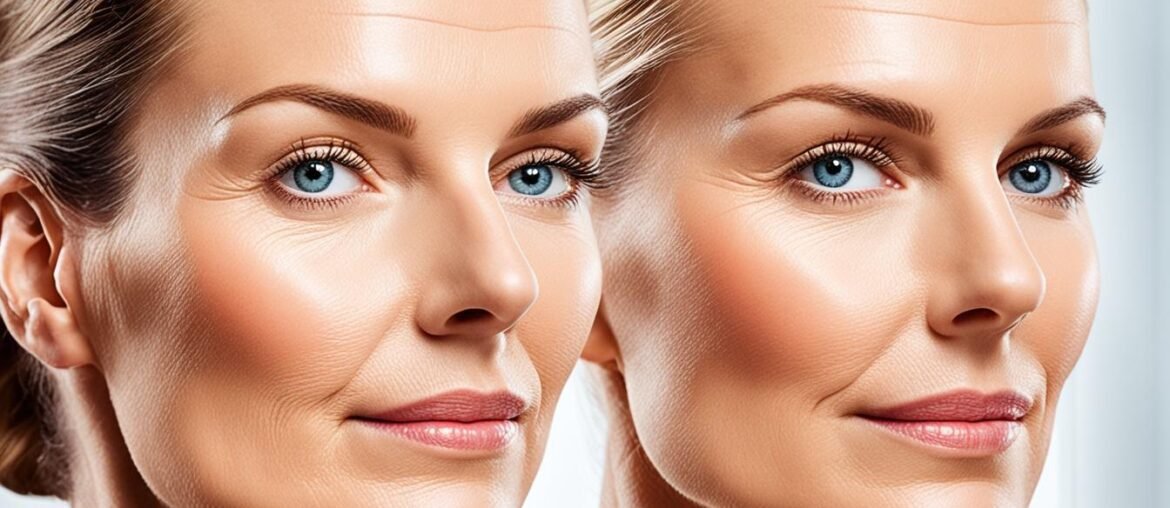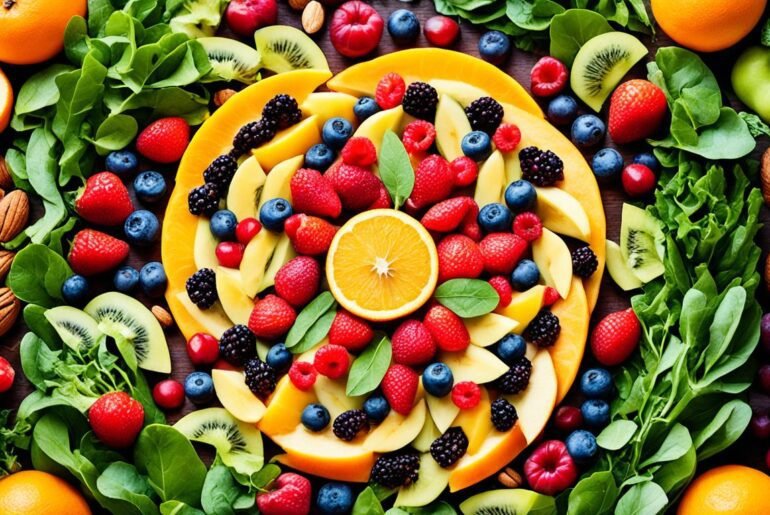Did you know that the foods you eat can have a significant impact on the health and appearance of your skin? Research studies have shown that nutrition plays a crucial role in maintaining a youthful complexion and combating the signs of aging. By incorporating specific foods into your diet, you can nourish your skin from the inside out and achieve a natural and radiant glow.
Key Takeaways:
- Nutrition plays a vital role in anti-aging skin care.
- Specific foods can support collagen production and improve skin elasticity.
- Antioxidants found in certain foods protect the skin from oxidative stress.
- A balanced diet contributes to overall skin health and helps prevent skin conditions.
- Incorporating anti-aging foods into your diet is a practical and effective way to support a youthful complexion.
The Role of Nutrition in Skin Aging
The aging process affects the structure and function of the skin, leading to visible signs of aging such as wrinkles, sagging, and loss of elasticity. Nutrition plays a critical role in combating these effects and promoting healthy aging. By incorporating anti-aging foods into your diet, you can support collagen production, improve skin elasticity, and maintain a youthful complexion.
The Importance of Healthy Aging
As we age, our body’s natural processes slow down, including the production of collagen, a key protein that gives skin its structure and elasticity. Collagen production declines with age, resulting in the formation of wrinkles and sagging skin. However, through proper nutrition, we can support collagen synthesis and promote healthy aging.
Anti-Aging Foods for Collagen Production
To boost collagen production and maintain a youthful complexion, it is important to include anti-aging foods in your diet. These foods are rich in essential vitamins, minerals, and antioxidants that nourish the skin from within. They provide the building blocks needed to support collagen synthesis, improve skin elasticity, and prevent premature aging.
| Anti-Aging Foods | Benefits |
|---|---|
| Oranges | High in vitamin C, which is essential for collagen synthesis and skin health. |
| Salmon | Rich in omega-3 fatty acids, which help reduce inflammation and support skin elasticity. |
| Spinach | Contains antioxidants that protect against oxidative stress and promote collagen production. |
| Avocado | Packed with healthy fats that nourish the skin and improve its texture. |
| Blueberries | Loaded with antioxidants that fight free radicals and support skin health. |
The Benefits of Improved Skin Elasticity
One of the key aspects of healthy aging is maintaining skin elasticity. When the skin has good elasticity, it can bounce back after being stretched or compressed, resulting in firm and youthful-looking skin. By focusing on nutrition and consuming collagen-boosting foods, you can improve skin elasticity and maintain a more youthful appearance.
Quote: “A healthy diet rich in anti-aging foods can support collagen production and improve skin elasticity, keeping you looking youthful and vibrant.” – Dr. Anna Smith, Dermatologist
By understanding the role of nutrition in skin aging, you can make informed choices to support healthy aging and maintain a youthful complexion. Incorporate anti-aging foods into your diet and embrace a holistic approach to skincare for optimal results.
Importance of Antioxidants for Skin Health

When it comes to maintaining the health and vitality of your skin, antioxidants play a crucial role. These powerful compounds help neutralize free radicals, which are unstable molecules that can wreak havoc on your skin cells. By preventing oxidative damage, antioxidants help protect your skin from premature aging and promote a youthful complexion.
Among the most beneficial antioxidants for skin health are vitamins A, C, and E. Vitamin A helps promote cell turnover, keeping your skin looking fresh and rejuvenated. Vitamin C boosts collagen production, improving skin elasticity and reducing the appearance of fine lines and wrinkles. Vitamin E acts as a potent antioxidant, shielding your skin from environmental stressors and supporting its overall health.
In addition to vitamins, other antioxidants found in certain foods can also contribute to skin health. For instance, resveratrol, a natural compound found in grapes and red wine, has been shown to have anti-aging effects on the skin. Green tea extract and pomegranate extract are also rich in antioxidants that can protect your skin from damage and promote a youthful glow.
Antioxidants are like superheroes for your skin, fighting off the villains of free radicals and oxidative stress. By incorporating foods rich in antioxidants into your diet, you can give your skin the support it needs to stay healthy, vibrant, and youthful.
The Benefits of Antioxidants for Your Skin:
- Preventing premature aging
- Protecting against oxidative damage
- Boosting collagen production
- Improving skin elasticity
- Reducing the appearance of fine lines and wrinkles
- Supporting overall skin health
By incorporating antioxidant-rich foods into your diet, such as brightly colored fruits and vegetables, nuts and seeds, and lean proteins, you can give your skin the nourishment it needs to thrive. Remember, a healthy diet supplemented with topically applied antioxidants can work together to enhance the health and appearance of your skin.
The Power of Collagen-Boosting Foods
Collagen is an essential protein that provides strength and elasticity to the skin, promoting a youthful and healthy appearance. Unfortunately, as we age, the production of collagen naturally declines, leading to the formation of wrinkles and sagging skin. However, there are certain foods that can help stimulate collagen production and support skin health, allowing us to maintain a more vibrant and youthful complexion.
By incorporating these collagen-boosting foods into your diet, you can promote healthy aging and nourish your skin from within. Here are some key examples:
| Collagen-Boosting Foods | Description |
|---|---|
| 1. Citrus Fruits | Packed with vitamin C, citrus fruits help stimulate collagen synthesis, improving skin elasticity and firmness. |
| 2. Leafy Green Vegetables | Rich in antioxidants and vitamins, leafy greens like spinach and kale aid in collagen production and protect against oxidative stress. |
| 3. Bone Broth | High in collagen and amino acids, bone broth supports collagen production, enhances skin hydration, and reduces the appearance of wrinkles. |
| 4. Berries | Loaded with antioxidants, berries help combat free radicals and promote collagen formation, leading to a more youthful complexion. |
| 5. Nuts and Seeds | Almonds, walnuts, chia seeds, and flaxseeds are rich in omega-3 fatty acids and antioxidants, supporting collagen synthesis and skin health. |
| 6. Avocado | Avocado is a great source of healthy fats and vitamin E, which nourishes the skin and helps maintain its elasticity. |
By incorporating these collagen-boosting foods into your diet, you can support the production of collagen, improve skin elasticity, and promote a more youthful and healthy complexion.
Nutritional Strategies for Youthful Skin
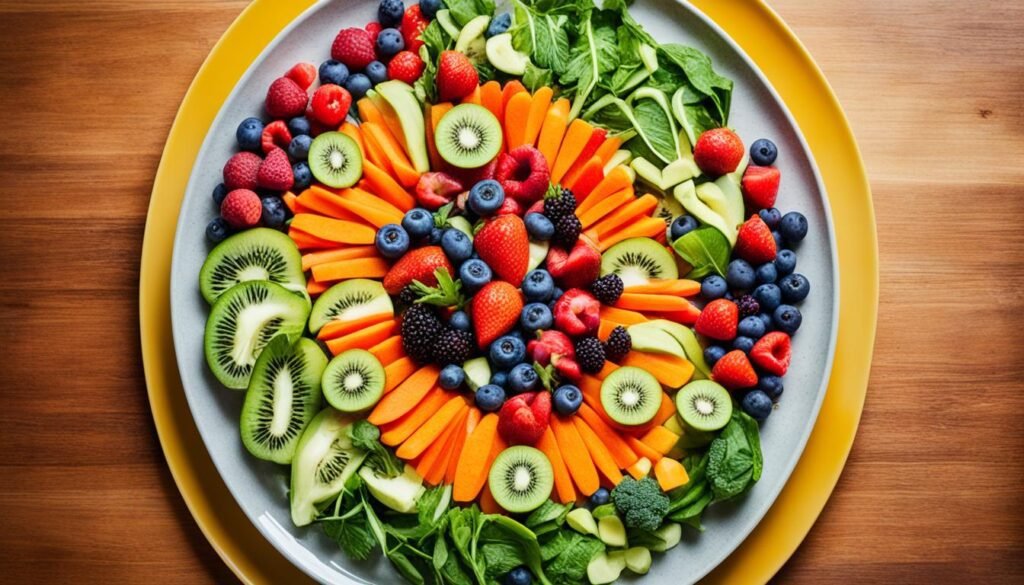
In addition to specific foods, adopting a healthy and balanced diet can provide vital nutrients for youthful skin. Eating a variety of fruits, vegetables, whole grains, lean proteins, and healthy fats can provide the necessary vitamins, minerals, and antioxidants needed for optimal skin health. It is important to establish a skincare routine that combines nutrition and topical treatments for maximum benefits.
The Importance of a Balanced Diet
A balanced diet is essential for maintaining overall health, including the health of your skin. By consuming a diverse range of foods, you can ensure that your body receives the nutrients it needs to support skin cell turnover, collagen production, and protection against oxidative stress.
- Eat a variety of fruits and vegetables: These provide essential vitamins and minerals that nourish the skin and protect against damage from free radicals.
- Incorporate whole grains: Whole grains contain fiber, which aids in digestion and promotes a healthy gut microbiome. A healthy gut is essential for proper absorption of nutrients that benefit the skin.
- Include lean proteins: Proteins like fish, poultry, and legumes are rich in amino acids, which are the building blocks of collagen. Collagen is vital for maintaining skin elasticity and firmness.
- Choose healthy fats: Consuming foods rich in healthy fats, such as avocados, nuts, and olive oil, can support the skin’s natural barrier function and keep it hydrated and supple.
The Role of Skincare Routine
While a balanced diet is crucial for healthy skin, it’s equally important to establish a skincare routine that complements your nutrition efforts. A proper skincare routine can enhance the benefits of your diet and address specific skin concerns.
Remember, skincare products are not meant to replace a healthy diet but rather to support and enhance its effects.
When choosing skincare products, look for those made with natural and organic ingredients. Avoid harsh chemicals and artificial fragrances that can irritate the skin and cause inflammation.
The Power of Natural Skin Care
Natural skin care products are becoming increasingly popular due to their minimal use of synthetic ingredients and focus on plant-based ingredients. These products can provide a gentle and effective solution for maintaining youthful skin.
When selecting natural skincare products, look for ingredients like:
- Aloe vera: Known for its soothing and hydrating properties, aloe vera can help reduce inflammation and promote skin healing.
- Green tea extract: Packed with antioxidants, green tea extract can protect the skin from free radical damage and promote a more youthful complexion.
- Jojoba oil: Similar in composition to the skin’s natural oils, jojoba oil can provide deep hydration without clogging pores.
By combining a healthy and balanced diet with a natural skincare routine, you can optimize your skin’s health and achieve a youthful and radiant complexion.
The Impact of UV Radiation on Skin Aging
Exposure to ultraviolet (UV) radiation is a major contributor to photoaging, a type of skin aging caused by environmental factors. The natural aging process, known as skin aging exposome, also plays a role in the overall aging of the skin. Both natural aging and photoaging can lead to the breakdown of collagen, the formation of wrinkles, and the development of age spots.
To maintain a youthful complexion, it is crucial to protect the skin from UV damage. This can be achieved by practicing sun-safe habits such as wearing sunscreen, seeking shade, and wearing protective clothing. Additionally, incorporating antioxidants into your diet can help counteract the harmful effects of UV radiation and support skin health.
Antioxidants, found in certain foods, have the ability to neutralize free radicals generated by UV radiation. Free radicals are highly reactive molecules that can cause oxidative stress and damage the skin cells. By consuming a diet rich in antioxidants, you can enhance your skin’s natural defense mechanisms and reduce the impact of UV radiation on skin aging.
“Protecting the skin from UV damage is crucial for maintaining a healthy and youthful complexion.”
Some of the best antioxidant-rich foods for skin health include:
| Food | Antioxidant Content |
|---|---|
| Berries (blueberries, strawberries, raspberries) | High |
| Dark leafy greens (spinach, kale, Swiss chard) | High |
| Nuts and seeds (almonds, walnuts, chia seeds) | High |
| Fatty fish (salmon, mackerel, sardines) | Moderate |
| Green tea | Moderate |
| Dark chocolate | Moderate |
Incorporating these antioxidant-rich foods into your diet can provide your skin with the necessary nutrients to combat the effects of UV radiation and promote skin health. Remember to always consult with a healthcare professional or dermatologist for personalized advice and recommendations.
Key Nutrients for Skin Health
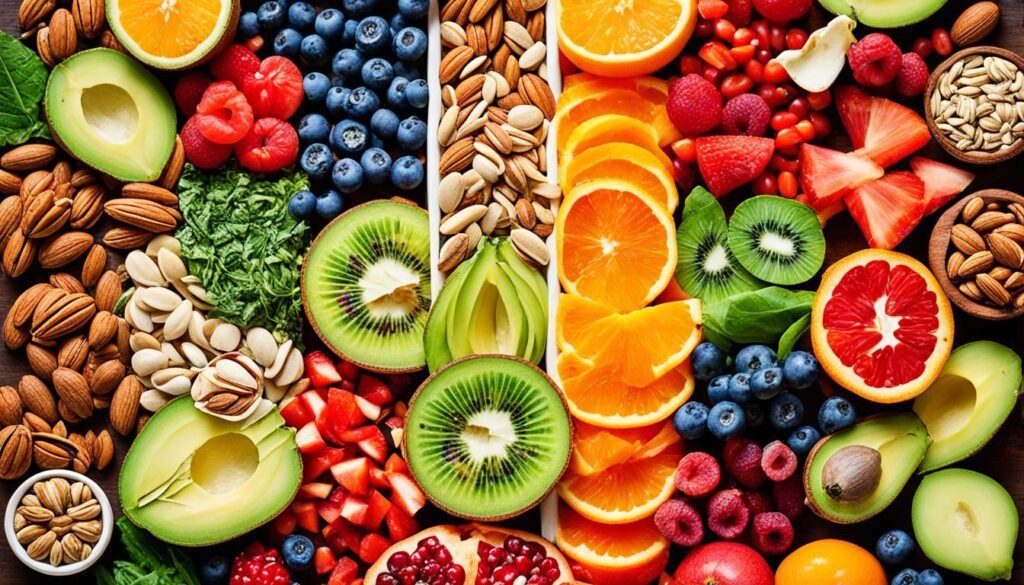
When it comes to maintaining healthy skin, several key nutrients play a vital role. Incorporating these essential vitamins into your diet can help promote overall skin health and support a natural skincare routine.
Vitamin C: Boosting Collagen and Elasticity
Vitamin C is an essential nutrient for skin health, renowned for its ability to boost collagen production. Collagen is a protein that provides structure and elasticity to the skin, helping to maintain a youthful complexion. By including foods rich in vitamin C, such as citrus fruits, berries, and leafy greens, you can enhance collagen synthesis and improve skin elasticity.
Vitamin E: Powerful Antioxidant Protection
Another key nutrient for skin health is vitamin E. Known for its antioxidant properties, vitamin E helps protect the skin from free radicals, which can cause premature aging. Foods like nuts, seeds, and avocado are rich in vitamin E and can promote a healthy, radiant complexion by reducing oxidative stress.
Vitamin A: Cell Turnover and Smooth Complexion
Vitamin A plays a critical role in promoting cell turnover, which is essential for maintaining a smooth complexion. This nutrient aids in the production of new skin cells, helping to reveal fresher, younger-looking skin. Foods such as carrots, sweet potatoes, and leafy greens are excellent sources of vitamin A and can support a healthy skin cell turnover process.
To ensure optimal skin health, it is important to incorporate a variety of nutrient-rich foods into your diet. Here is a table highlighting the top food sources for these key vitamins:
| Vitamin | Top Food Sources |
|---|---|
| Vitamin C | Citrus fruits (oranges, grapefruits), berries (strawberries, blueberries), leafy greens (spinach, kale) |
| Vitamin E | Nuts (almonds, sunflower seeds), seeds (flaxseeds, chia seeds), avocado |
| Vitamin A | Carrots, sweet potatoes, leafy greens (spinach, kale) |
Incorporating these nutrient-rich foods into your daily diet can provide the essential vitamins your skin needs for optimum health. Remember, nutrition plays a significant role in supporting natural skincare practices and promoting a radiant, youthful complexion.
The Connection Between Nutrition and Skin Conditions

Nutrition plays a vital role in the health and integrity of our skin. Deficiencies and imbalances in our diet can contribute to the development of various skin conditions, including collagen alterations, impaired skin integrity, and changes in the epidermal stem cells.
Collagen, the main structural protein in the skin, is crucial for maintaining its strength and elasticity. Poor collagen synthesis, resulting from inadequate nutrition, can lead to sagging skin, wrinkles, and a loss of firmness.
Impaired skin integrity refers to a compromised skin barrier, which can occur due to deficiencies in essential nutrients. This can result in dryness, sensitivity, and an increased susceptibility to environmental damage.
Furthermore, alterations in the epidermal stem cells, which are responsible for skin regeneration, can be influenced by nutritional factors. A lack of specific nutrients in our diet may impair the production and function of these vital cells, leading to a slower healing process and an increased risk of skin infections.
Addressing nutrient deficiencies and following a well-balanced diet is essential for supporting the health and integrity of our skin. By nourishing our bodies with the right nutrients, we can promote collagen synthesis, enhance skin barrier function, and provide the necessary building blocks for optimal skin cell turnover and regeneration.
| Nutrient | Food Sources |
|---|---|
| Omega-3 Fatty Acids | Fatty fish (salmon, sardines), chia seeds, walnuts |
| Antioxidants (Vitamins A, C, E) | Colorful fruits and vegetables, nuts, seeds, leafy greens |
| Collagen-Boosting Nutrients | Bone broth, chicken, fish, citrus fruits, berries |
| Probiotics | Yogurt, kefir, sauerkraut, kimchi |
| Zinc | Oysters, beef, pumpkin seeds, lentils |
| Selenium | Brazil nuts, fish, eggs, whole grains |
Choosing a wide variety of nutrient-rich foods can help ensure that we obtain the essential vitamins, minerals, and antioxidants needed for optimal skin health. Additionally, it is important to consult with a healthcare professional or a registered dietitian to address specific nutritional concerns and tailor a diet plan that supports the unique needs of our skin.
Practical Tips for Anti-Aging Skin Care Through Nutrition
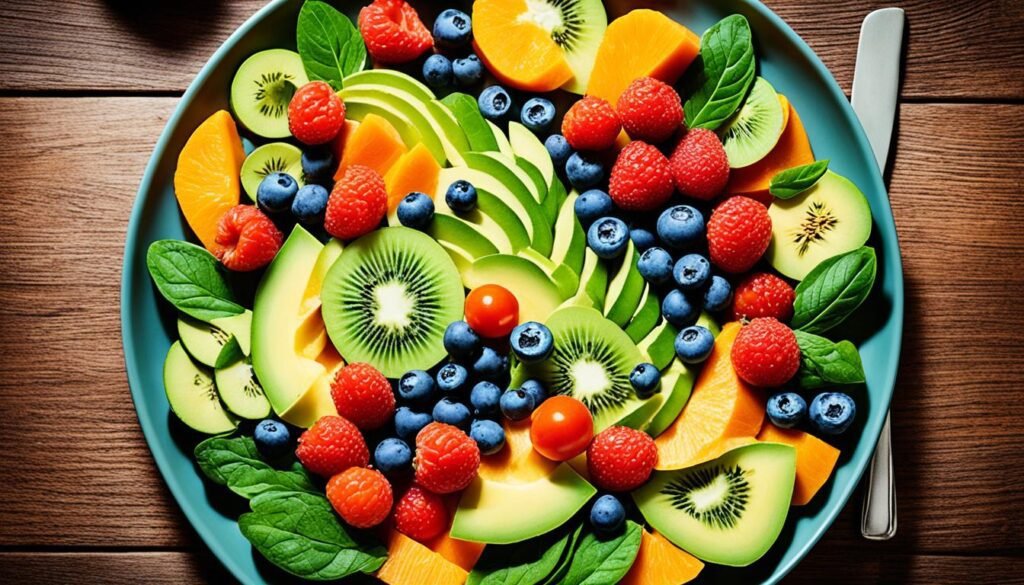
Incorporating anti-aging foods into your daily diet doesn’t have to be complicated. By following a few practical tips, you can easily boost your nutrition for healthier skin. Here are some effective strategies:
1. Include a Variety of Colorful Fruits and Vegetables
Eating a wide range of fruits and vegetables ensures that your body receives a diverse array of vitamins, minerals, and antioxidants. Aim for a colorful plate with each meal, incorporating options like:
- Spinach and kale: rich in vitamins A, C, and E, which promote collagen production and fight oxidative stress.
- Blueberries and raspberries: packed with antioxidants that protect against skin damage caused by free radicals.
- Papaya and oranges: excellent sources of vitamin C, supporting collagen synthesis and skin elasticity.
2. Opt for Whole Grains and Lean Proteins
Choosing whole grains and lean proteins as the foundation of your meals can provide essential nutrients and support healthy aging. Opt for:
- Quinoa and brown rice: rich in antioxidants and fiber, promoting skin health and digestion.
- Salmon and tofu: high in omega-3 fatty acids, which reduce inflammation and enhance skin moisture.
- Beans and lentils: excellent sources of protein, offering amino acids necessary for collagen synthesis.
3. Stay Hydrated
Drinking an adequate amount of water throughout the day is essential for maintaining hydrated and plump skin. Aim for at least 8 glasses (64 ounces) of water daily. Additionally, including hydrating foods like watermelon, cucumber, and citrus fruits can further support your skin’s moisture levels.
4. Minimize Processed Foods and Sugars
Avoiding processed foods and excessive sugar intake is crucial for healthy aging and maintaining a youthful complexion. These foods can contribute to inflammation and collagen breakdown. Instead, opt for whole, unprocessed foods whenever possible.
By implementing these practical tips, you can enhance the effectiveness of your skincare routine and support healthy aging from within.
| Anti-Aging Food | Benefits |
|---|---|
| Avocado | Rich in healthy fats and antioxidants that moisturize and protect the skin. |
| Walnuts | Packed with omega-3 fatty acids, which reduce inflammation and support skin health. |
| Dark Chocolate | Contains flavanols that improve blood flow to the skin and protect against sun damage. |
| Green Tea | High in catechins, which have anti-inflammatory and anti-aging effects on the skin. |
| Pomegranates | Loaded with antioxidants that protect against free radicals and promote collagen production. |
| Tomatoes | Rich in lycopene, a powerful antioxidant that helps reduce signs of aging. |
Conclusion
In conclusion, achieving and maintaining a youthful complexion is not only dependent on external factors but also on the nutrition we provide our bodies. By incorporating anti-aging foods into our diet, we can nourish our skin from within and support its overall health. The combination of a nutritious diet and a well-rounded skincare routine can produce the best results in maintaining a youthful and healthy complexion.
It is important to remember that our skin reflects what we put into our bodies. A diet rich in fruits, vegetables, whole grains, lean proteins, and healthy fats can provide the essential nutrients, vitamins, minerals, and antioxidants necessary for optimal skin health. These nutrients help promote collagen production, improve elasticity, and protect against oxidative stress, minimizing the visible signs of aging.
While nutrition plays a significant role in achieving a youthful complexion, it is equally crucial to adopt a comprehensive skincare routine that complements our dietary efforts. Cleansing, moisturizing, and applying sunscreen are essential steps in maintaining healthy skin. By combining nutrition and skincare practices, we can unlock the full potential of our skin’s natural resilience and radiance.
FAQ
How does nutrition affect skin aging?
Nutrition plays a critical role in maintaining healthy and youthful skin. Certain foods can support collagen production, improve skin elasticity, and protect against oxidative stress, a major contributor to skin aging.
What role do antioxidants play in skin health?
Antioxidants are essential for maintaining skin health and preventing premature aging. They help neutralize free radicals and protect the skin from environmental stressors. Vitamins A, C, and E are powerful antioxidants that can promote a youthful complexion.
Which foods can stimulate collagen production?
Certain foods can stimulate collagen production and support skin health. These include foods rich in vitamin C, such as citrus fruits and berries, as well as protein sources like lean meats and legumes.
How does nutrition contribute to overall skin health?
A healthy and balanced diet provides the necessary vitamins, minerals, and antioxidants needed for optimal skin health. Eating a variety of fruits, vegetables, whole grains, lean proteins, and healthy fats can nourish the skin from within.
How does UV radiation affect skin aging?
UV radiation can lead to the breakdown of collagen, the formation of wrinkles, and the development of age spots. Protecting the skin from UV damage is crucial for maintaining a youthful complexion. Antioxidants found in certain foods can help counteract the harmful effects of UV radiation.
Which vitamins are important for skin health?
Several vitamins play a vital role in maintaining healthy skin. Vitamin C is essential for collagen production, vitamin E acts as a powerful antioxidant, and vitamin A promotes cell turnover. Including foods rich in these vitamins, such as citrus fruits, leafy greens, and carrots, can contribute to overall skin health.
Can nutrition affect the development of skin conditions?
Nutritional deficiencies and imbalances can contribute to the development of various skin conditions. Poor collagen synthesis, impaired skin integrity, and alterations in epidermal stem cells have been linked to specific nutritional factors. Addressing nutrient deficiencies and following a balanced diet can support the health and integrity of the skin.
What are some practical tips for anti-aging skin care through nutrition?
Incorporating anti-aging foods into your daily diet can be as simple as consuming a variety of colorful fruits and vegetables, opting for whole grains and lean proteins, staying hydrated, and minimizing processed foods and sugars. Small changes in your eating habits can have a significant impact on your skin health.
How can nutrition contribute to a youthful complexion?
By incorporating anti-aging foods into your diet, you can nourish your body from within and support the health of your skin. Combine nutrition with a well-rounded skincare routine to maximize the benefits and achieve a youthful and healthy complexion.

